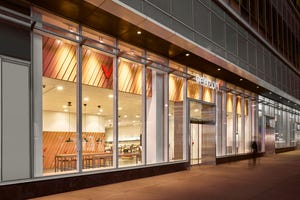Spectrum up for Grabs in Europe
As new wireless spectrum becomes available in Europe, mobile operators are being given more freedom by regulators
March 13, 2007

Europe's wireless spectrum scene is set for a significant shakeup as new mobile licenses become available and regulators become more relaxed about which technologies license-holders can use (see table below).
Table 1: Upcoming European Wireless Spectrum Awards
Country | Frequency | Potential Uses | Potential Bidders | Date of Auction/Beauty Contest |
France | 2.1 GHz | 3G | Iliad and Noos | July 2007 |
Germany | 2.6 GHz | 3G expansion band | T-Mobile, E-Plus, Vodafone, O2 | Early 2008 |
Ireland | 1785-1805 MHz | broadband wireless access | March 2007 | |
Italy | 3.5 GHz | WiMax | FastWeb, Tiscali, Telecom Italia | June 2007 |
Norway | 2.6 GHz | 3G expansion band, technology neutral | Telenor, TeliaSonera's NetCom | October 2007 |
Portugal | 3.4 GHz-3.6 GHz | WiMax | 2007 | |
Sweden | 3.6 GHz-3.8 GHz | mobile WiMax, technology neutral | TeliaSonera, Bredbandsbolaget (B2) | October/November 2007 |
Sweden | 2.6 GHz | 3G expansion band, technology neutral | TeliaSonera, Telenor, Tele2, 3 | Spring 2008 |
United Kingdom | 2.6 GHz | 3G expansion band, technology neutral | Not known | End 2007 |
United Kingdom | 479 MHz - 868 MHz | currently in consultation | Not known | Consultation ends in March 2007 |
In France, regulator ARCEP has launched the tender process for the fourth and last remaining 3G license in France. (See ARCEP Invites 3G Bids.)
The fourth French 3G license will cost €619 million (US$818 million), plus 1 percent of revenues, which is what the three current 3G service providers, Salt SA , SFR , and Bouygues Telecom , paid for their UMTS licenses.
It will be awarded by beauty contest rather than a bidding process, with ARCEP choosing the winner based on the operators' proposals for territory coverage (80 percent of the country), speed of deployment, and the services that will be offered. Interested bidders have until the end of July to submit applications, and ARCEP will make the final decision by March 2008.
Iliad (Euronext: ILD), best known for its triple-play ISP Free , has expressed interest in this license, while cable operator Numericable-SFR is also reportedly interested. (See Iliad Eyes Mobile License.)
ARCEP says it needs to allocate the fourth 3G license because it wants to consult on the possibility of allowing mobile operators to use the 900MHz and 1800MHz spectrums awarded for 2G GSM services for 3G services, something they aren't currently permitted to do. Orange and SFR have requested permission to do this, says an ARCEP spokesman.
"We will soon allow 3G licensed operators to go into GSM bands... after the fourth 3G license [is awarded]," says the spokesman. "Before allowing them to do that, we have to know how many operators will need to share these frequencies."
The French regulator may be the first to introduce this new frequency reuse policy in Europe. The European Commission is in favor of allowing operators to use 2G spectrum for 3G services, a move that has been welcomed by GSM Europe, part of the mobile operators' trade body, the GSM Association (GSMA) .
"This would allow faster takeup of 3G services," says Eirini Zafeiratou, director of GSM Europe.
However, the ultimate decision and details will be battled out in each of the member states.
The main benefit for reusing 2G spectrum is cost savings, explains Amit Nagpal, principal consultant at Analysys . Operators can get additional coverage by using lower frequencies, and fewer base stations would be needed. Also, the GSM frequencies provide better indoor coverage.
"This spectrum policy is also a useful tool alongside other measures, such as site or infrastructure sharing, so should not be treated as a panacea for cost reduction, any more than, for example, outsourcing," says Mike Short, vice president of research and development at pan-European operator Telefónica Europe plc (O2) .
Technical neutrality
The other big shift in European spectrum policy is the move away from dictating which technologies and services can be used in allocated frequency bands. The U.K. was first to introduce "technical neutrality," as it is known, to spectrum policy in late 2005.
"We don't specify what the license should be used for," says an Ofcom spokesman. "We feel the market is better placed to make that decision."
This issue is most contested in the 3G expansion band, 2.6 GHz, which is due to be auctioned this year in Norway and next year in Germany and Sweden. The original intent for this spectrum was for 3G services, but some regulators are looking to apply technical neutrality to this spectrum, which means it could potentially be used for WiMax, for example.
That's a move the big 3G equipment vendors, such as Ericsson AB (Nasdaq: ERIC), oppose.
The Swedish regulator, PTS, intends to open up the 2.6GHz band to other technologies, as well as 3G.
"Ericsson is the player that is very much against using [this band] for other things than [3G]," says Katarina Wretman, director of the spectrum management department at PTS. "It has to accept that we might get operators in an auction who want to use [the spectrum] for something else.
"There aren't many bands available for [3G]. We also want to see it as an expansion band, but we need to let the market decide."
The tension over the 3G expansion band comes down to how much frequency is assigned to time division duplex (TDD), which is used for WiMax, and frequency division duplex (FDD), which is used for 3G. "The battle between WiMax and IMT-2000 is happening in the 2.6GHz band," says Wretman.
In Germany, the regulator has not yet determined the frequency allocation terms for the 2.6GHz band. But when it is auctioned, the existing 3G operators are likely to bid for licenses as a defensive move.
"They'll probably buy the spectrum to keep anyone from coming in and competing with them," says Sylvain Fabre, research director in the communications group at Gartner. "These are the noises we've heard from T-Mobile International AG and E-Plus Mobilfunk GmbH . But they don't physically need it at the moment... [though] more spectrum is always good."
And the Norwegian Post and Telecom Authority delayed its 3G expansion band auction to later this year because it needed more time to decide on the terms and conditions, but the license terms will be based on technical neutrality.
— Michelle Donegan, European Editor, Light Reading
About the Author(s)
You May Also Like












